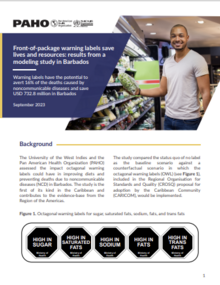Overview
Unhealthy eating has been driven largely by the widespread availability, affordability, and promotion of ultra-processed and processed food products that are excessive in sugars, fats, and sodium. As such, an essential part of the solution requires the use of laws and regulations to reduce the demand for and offer of products that contain excessive amounts of critical nutrients. One of the key policy tools to regulate such products to prevent them from unbalancing diets is the use of front-of-package labeling (FOPL) to indicate to consumers which products contain excessive amounts of sugars, total fats, saturated fats, trans fats, and/or sodium. This publication presents evidence on the expected impact of the adoption of octagonal warning labels on health and economy of a country. It features results from Barbados, showing warning labels have the potential to avert 16% of the deaths caused by noncommunicable diseases and save the country USD 732.8 million.
|

